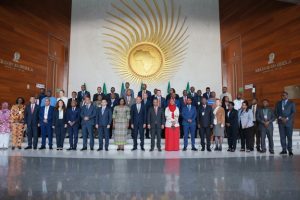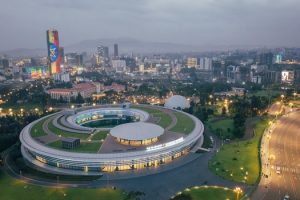
BYMEHARI BEYENE
As digitalization is a critical accelerator for sustainable development goals, many countries have given due emphasis on hastening digital technology journey globaly. Because it’s a business-driven technology, it helps to foster effective digital economic transformation. Likewise, Ethiopia has been focusing on digital transformation drive .Because services offered by the technology will provide greater efficiency and enable to meet the intended economic development ambitions.
In connection with digital transformation journey, Kenya can be taken as an exemplary lesson for Ethiopia to spur innovation for all rounded development. In this aspect, Kenyan President, Uhuru Kenyatta, delivered an inspiring keynote address during the United Nations Economic Commission for Africa fourth African Business Forum, emphasizing the importance for African governments to create enabling regulatory environments, develop vibrant and sustainable financial and research support structures to spur innovation on the continent.
Kenyatta said partnering with a broad range of technology players across the ecosystem around the world was also crucial for Africa to fully reap the benefits of digital technologies in expanding job opportunities or supporting the growth of micro, small, and medium enterprises on the continent.
“Kenya is making digitization central to its post-COVID-19 recovery strategy and a critical accelerator of the sustainable development goals,” the President told delegates attending the forum which was held on the margins of the 34th Ordinary Session of the African Union Assembly of Heads of State and Government.
He said digital technologies have the potential to impact positively on the economy, expand opportunities especially for Africa’s youth, improve service delivery, and transform societies.
The President, who emphasized the importance of African leaders opening up their economies to intra-African trade now that the African Continental Free Trade Area was operational; said digital technologies have become a key pillar of Africa’s response strategy to the COVID-19 pandemic.
“In the face of containment measures necessitated by the pandemic, technology has kept governments and businesses running; and enabled international cooperation and engagements, such as we are involved in today to, be sustained,” Kenyatta, who lead discussions with young African innovators in the session on innovative financing to harness technology, said.
Crescence Elodie Nonga, Founder of Women in Entrepreneurship and Technology, Awa Caba, Co-founder and CEO of Soreetul, Dominic Salvio Wambugu, Co-founder of Mkulima Bora and Alexandre Coster, Founder and CEO of Baobab conversed with the President about digital technologies, women, youth and innovation.
They also discussed what it will take for the public and private sector to push the continent into the fourth industrial revolution and harness technology and financial inclusion for the continent’s development.
President Kenyatta highlighted key issues Kenya is focusing on in its digital journey.
“Kenya, rightly dubbed the “Silicon Savannah”, can attest to the transformative power of innovation and digital technologies. We have a huge ambition to transform into an industrialized and job-rich economy,” he said.
Kenya has embraced the digital revolution and its disruptive technological innovations as a “spear point of our development strategy”.
The strategy is anchored on five key pillars, namely: providing affordable, accessible, and reliable digital infrastructure; development of digital government; development of digital business; development of digital skills and values; and creation of an ecosystem that enables and cultivates innovation-driven entrepreneurship.
Answering questions from the panel, Kenyatta emphasized the need to mainstream women’s participation in all sectors of the economy, adding access to education was key in achieving this.
“The different measures that we are trying to take, as a government, as a country to make sure we mainstream women into all sectors of our system, from governance, to the economy, to society – that they are a part and parcel – and by leaving them out – we are leaving like I said, half the country out and reducing our capacity to become superpowers by actually half.”
“So in Kenya, you have a friend and we shall continue to partner and to work together not only in Kenya but across the continent, to ensure that women are able to take their rightful space in society,” assured the President.
For her part, United Nations Econoic Commission for Africa Executive Secretary, Vera Songwe, said Africa was at a point of great challenge and great opportunity.
The negative economic impact of COVID-19, and the difficulties in meeting the sustainable development goals, including youth employment were very significant challenges, she said.
“At the same time the continent represents enormous opportunities for private sector investment to drive inclusive growth and build forward better. The private sector working with government can come up with solutions for innovative financing, particularly in technology and energy,” said Songwe.
She said Africa only received 2.4 billion USD of investment across all sectors against a big shortfall to close the gap, for example in the energy sector alone, annual investments of between 50 and 70 USD billion are need if Africa is to move close to attaining the development goals.
“With over 600 tech hubs led by youths in Africa, we urgently need to factor in intellectual property rights, necessary for protecting their innovations,” said Songwe.
The United Nations Economic Commission for Africa Chief said Africa, despite current difficulties, needs to continue forging ahead to achieve the sustainable development goals and bridging the gender gap.
The second panel gathered experts and thought leaders in the finance and energy sectors. The panelists discussed how to capitalize different financing options in energy while improving the sector with the need for innovation and smart policies being a key issue as was economic diversification for the resource-endowed Africa.
The last session introduced Team Energy Africa, which is mobilizing the continent’s business community to invest in powering Africa towards inclusive development and prosperity. The session featured NJ Ayuk, Executive Chairman of the African Energy Chamber and CEO of pan-African corporate law conglomerate, Centurion Law Group, and Linus Mofor, Senior Environmental Affairs Officer in charge of energy, infrastructure and climate change at the African Climate Policy Centre of the United Nations Economic Commission for Africa.
The event brought together leaders from government and business with a strong appeal for greater collaboration between the private and public sector in digital technologies, energy and innovative financing.
The forum, which focused on innovative financing to harness technology and innovative financing in energy for economic diversification, was held under the theme; “Innovative Finance: Building towards the sustainable development goals.
THE ETHIOPIAN HERALD JULY 2 /2021




